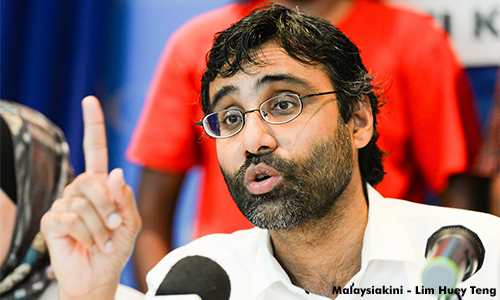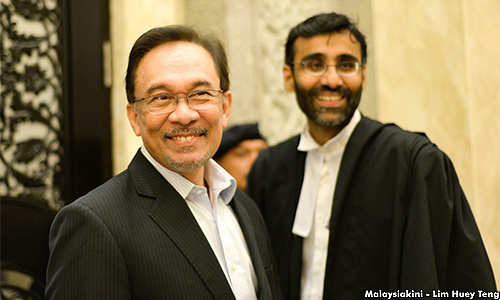
PKR president Dr Wan Azizah Wan Ismail was not very elucidating when she explained the party's decision to drop some incumbents and replace them with choices that puzzled.
“It's normal in general elections. Sometimes you get chosen, sometimes you don't,” offered the sometime ophthalmologist, in response to queries about why some incumbents were dropped from the PKR slate for GE14.
As explanations go, this one is about as useful as would be the case if an Umno wag were to say, “It's normal for people to donate to political parties. Sometimes you get big royal donors, sometimes you don't.”
Much drama accompanied the unveiling of the PKR list.
Again, this wasn't a surprise: over the last four years, the party has been a cockpit of factional strife.
Hence the high drama accompanying the announcement late Monday of the candidate list as speculation swirled over which faction had got the better of the other in gaining the endorsement of the party's ruling trinity, composed of incarcerated husband (Anwar Ibrahim), deputising wife (Wan Azizah) and anointed heir (Nurul Izzah Anwar).
In the fret and fever, derision and disaster that attended the drama, party faithful could be excused for failing to recall that 19 years ago, Parti Keadilan Nasional, PKR's precursor, was set up to combat the corruption, cronyism and nepotism of the ruling Umno-BN.
It's not as if a flawed PKR is not preferable to the ruling coalition, now much advanced in the dysfunctionality that was already evident two decades ago when Anwar became an international cause celebre as casualty of Umno's periodic convulsions.
It's just that a public less beguiled, less left in ignorance of the limits and frailty of competitors for leadership of the polity, would be less inclined to disillusion and rancour when, as happens often, aspirants turn out to be less impressive than their resumes.
Consider the resume of M Karupaiya, the nominee PKR preferred to its incumbent for the parliamentary seat of Padang Serai in Kedah, N Surendran, a human rights lawyer of national renown if not accomplishment.
Karupaiya's papers say he is a holder of a Form V certificate.
In his late 60s, that would make him the possessor of a Senior Cambridge certificate, a qualification not to be sniffed at when you put that against the quality of some present-day holders of diplomas and degrees the tertiary conveyor belt in Malaysia is churning out.
Karupaiya joined PKR in 2013, the year Surendran was elected MP for Padang Serai on a PKR ticket.
Surendran had enlisted in PKR a few years earlier, following a bout of pro bono legal work for Hindraf, the NGO that in the mid-2000s was starting to figure prominently in the rousing of the political consciousness of the Indian Malaysian underclass.
He drew away from Hindraf about the time when its rhetoric began to verge on what is considered inviolable in Malaysian politics – the questioning of Malay privileges as spelt out in Article 153 of the constitution.
His human rights advocacy gained him an early prominence in PKR, a party whose leaders are often enmeshed in legal tangles with the government. Surendran was often counsel for the arraigned, including matters to do with the de facto head of the party.

Surendran keeps mum
Karupiya is involved in the transport business, an occupation he took to after retiring from the Armed Forces.
He was not known to have had an interest in politics until he was not able to park his lorries where he lived in the Indian enclave of Paya Besar in Padang Serai, due to roadworks that caused a diversion to traffic in his area of residence.
He joined PKR and soon became divisional leader of the party for Padang Serai.
Doling out sums to Tamil schools and Hindu temples in Padang Serai, Karupaiya won the divisional leader's post which Surendran was not interested to contest, simply because his legal work for PKR had him mired in the Klang Valley.
However, Surendran was active in fighting for citizenship for stateless residents in Padang Serai and for welfare aid for the indigent in his constituency.
In the latter instance, he was photographed carrying a handicapped supplicant up the flight of stairs to the welfare department located on the first floor of a government building.
On Surendran's promptings, the welfare office was relocated to more easily accessible premises in Padang Serai.
In Parliament, Surendran was a thorn in the speaker Pandikar Amin Mulia's side, questioning the decisions of the Lower House's arbiter when these deviated from the rules as perceived by the lawyer-legislator. For his pains, he was suspended for a long spell.
PKR and other opposition MPs regard Pandikar as a poor referee, and view Surendran's take on parliamentary rules as more consonant with the practices of democracies in the Commonwealth.
In PKR circles in Padang Serai, Karupaiya has distinguished himself as a fount of vituperation against Surendran and the latter's claque of supporters.
Anwar is known to have said Karupaiya is not qualified to be a PKR candidate for MP. His selection represents a triumph for one side of the destructive factional battle in PKR.
The leader of this side is nationally and justifiably renowned for his exposes of government corruption but is thoroughly obnoxious in the conduct of his virulent battle against the other side.
Surendran is allied to the other side of this battle, not so much, one suspects, from ideological congruence but from aversion for the tactics and methods of the leader of the side that has preferred Karupaiya to him.
Surendran is a gentleman who declined to be drawn by this reporter for background material for this commentary. He is a party man.
It's not too late to retract Karupaiya's nomination, which is almost entirely without merit. But the hold the leader of one side of the factional strife has on Azizah is too strong for rebuff.
She ought to have stayed at home and her daughter in Lembah Pantai, instead of fleeing to contest in Permatang Pauh.
A conjured heroine's aura is no substitute for the real thing in the school of hard knocks and defeat. Ask the Pakatan Harapan chair for his sense in this matter.
At a young 38 years of age, the knocks and probable defeat would be a good antidote for the hubris and corruption of sensibility that seems so quickly to have befallen that factional leader and appears set to infect Nurul Izzah.
TERENCE NETTO has been a journalist for more than four decades. A sobering discovery has been that those who protest the loudest tend to replicate the faults they revile in others. - Mkini


No comments:
Post a Comment
Note: Only a member of this blog may post a comment.